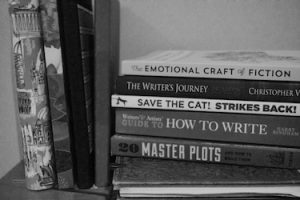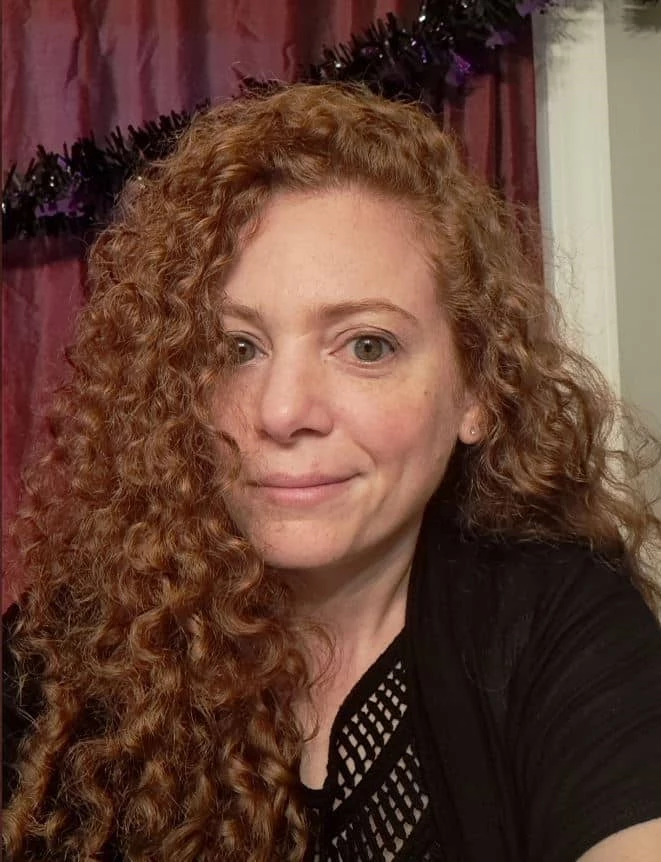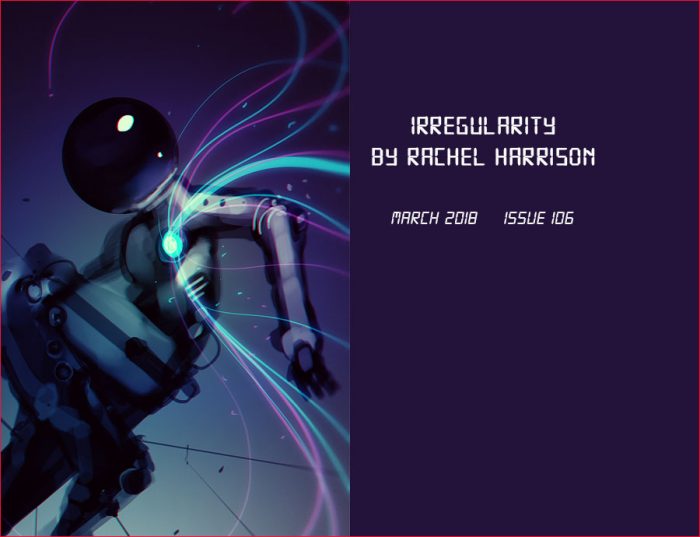
When the survival of humanity hangs in the balance, the most important thing a person can do is exactly what they are told. Our watchers sit at stations across the solar system, waiting, watching, observing, reporting. These brave souls are all that stands between humanity and the aliens who nearly obliterated us.
Rachel Harrison’s “Irregularity” is a deceptively quiet story. Nyle only sees his station partner, Veena, for a few minutes a day. Living an introvert’s dream, he is alone with his thoughts and his observations for months at a time. At first, his emotional walls were for necessity, then they became habit. His job is to watch for alien communications for anything that might mean our enemies have returned. For twelve hours a day, on a station whose seasonal settings subtly remind him that his kind shouldn’t even be there, he sits safe in his patterns and habits, watching for anything out of the ordinary. Along with his regrets, Nyle knows exactly what he’d do differently, if given another chance.
If you look hard enough at something, you’ll see what you want to see. If you really want to find a pattern in something, you’ll find a pattern, even if you have to talk yourself into what it might be. What patterns do I see when I look at Nyle? What does he see as he watches the stars? What is he hoping to see?
Nyle is very good at doing exactly what he’s told. In fact, he might be the perfect soldier.
Like I said, this is a rather quiet story. It’s the kind of quiet that sneaks up on you, gives you a false sense of security, and then tells you in crystal-clear tones that this is inescapably a horror story. In all its psychological horror glory, there is nothing in this story that can be out-run, out-gunned, or out-planned. If you like Peter Watts, you’ll love “Irregularity.” And if you like “Irregularity” (I know you will!), give Peter Watts a read. You can thank me later. You know, I’m not usually a horror fan. Monsters, creepy, weird people, stalkers, witches, angry, attacking animals, aliens; they tend to annoy me more than scare me. But when we’ve lost before we even knew we were fighting? Now that is the kind of horror I am here for!
A lover of monsters and wonderful food, Rachel Harrison lives in Nottinghamshire, UK. Most famous for her Warhammer 40,000 stories, which include “Dishonoured,” “The Third War,” “Binding,” and “The Blooding” for Black Library, as well as the recently published short story “Execution,” Rachel enjoys mixing monsters, wounds that won’t heal, dichotomies, and dystopia to create her unique brand of fiction.
You can chat with Rachel on twitter, where she is @rharrisonwrites. In between all the Warhammer 40,000 questions, make sure you ask her about the famous pizza episode that was caught on film.
APEX MAGAZINE: Nyle Crane watches the stars all day long, he has high military clearance to access just about any documents he wants, and he barely ever has to talk to anyone. As an introvert, that sounds like a dream job. You know, except for all the isolationism and lack of meaningful human contact. How did you get into the head of someone who is suffering from isolationism, to get his responses and psychological needs just right?
RACHEL HARRISON: This is such a great question.
I’m also an introvert by nature, but I think there’s something key in the difference between chosen and enforced isolation, and Nyle’s job is definitely the latter. I know for a fact, when I spend a long time on my own working on a project, I long just for noise. That’s why those ambient sound playlists are so popular, I think—it’s a facsimile for life-noise.
Without wishing to be horribly melodramatic (my default setting), I have quite the tendency to mull things, and that’s where this story came from. I thought about the fact that if you had a job like Nyle’s, you’d be given a lot of time just to think, and being stuck out in the blackness of space would just turn those thoughts further and further inward until they became obsessive. You would have to get all of your noise from yourself, in lieu of getting it from other people.
AM: This is a future in which having the ability to shut up and do what you’re told makes for a valuable pilot, soldier, and observer. What was the seed of this story, and of this type of future?
RH: I’m really inspired by both dystopian settings and by settings in which people are almost militarised by necessity (The 2004 reboot of Battlestar Galactica comes to mind …). The militaristic angle is definitely where the “do what you’re told” comes from, but it’s all the more powerful when it applies to those who aren’t military—they are just living in a hard-edged framework.
The other thing was that everyone can relate to having a job to do and to the routines that you settle into on a day-to-day. Wake-up alarms and breakfast and the commute. I just wanted to take that to the next extreme, but keep the characters’ reaction to it not that far from what ours would be to traffic. In their world, this is what jobs are like, and Nyle’s isn’t even the worst one he could have, especially given his birthplace and upbringing.
AM: Might things have gone differently if Veena had been in the watcher’s chair when the “irregularity” came through?
RH: I love this question, because it made me really think.
The answer is that Veena would have required a different type of breaking to Nyle. To some degree, he blames his pliant brain for what happens, but it’s not just that. It’s his guilt and his loneliness and his stubbornness. He doesn’t give up on the signal because he’s never been able to give up on Sylvie, even though she’s been dead for some time by the start of the story.
If I had to write it again, from Veena’s point of view, I think the Phonoi would have been much more direct with her, but she wouldn’t have been immune. Everyone is carrying something around in their head that makes them vulnerable.
AM: Thank you for putting so much of Nyle’s background into the story, especially the details about how people from different colonies and stations are viewed, and what he had to do to get into the academy. Is thinking about Sylvie, and bringing those memories to the surface, what makes him vulnerable to the irregularity? Why might one person be more vulnerable than another to this kind of “communication”?
RH: I enjoy development a lot—particularly societal structures. There’s imbalance in every setting and it always informs character. It’s part of why Sylvie elevates so much for Nyle. It’s not just because she’s the first person he really connects with, but she’s fundamentally other, with her high-ranking mother and her influential father. That they can connect the way they do across the gulf of their upbringings is part of what makes the breakdown of their relationship, and her subsequent death, so hard for him.
Nyle’s thoughts about Sylvie definitely make him vulnerable, both to the irregularity, and in general. The whole story is about the hurt that comes from old wounds, I suppose. When he’s hooked up to those outstations and roving space probes, he’s essentially exposing his mind to the darkness (literally and figuratively). The other thing with Nyle is that he’s unsettled in his role. The routine of it is wearing him thin. It’s like he says—he almost wants to find something, just so things will change.
Though, of course, that proves a foolish wish.
AM: How did you get involved with writing Warhammer fiction? Are there other franchises you’d like to write in?
RH: I’ve been into Warhammer since I was about seventeen. My now-husband taught me how to play (Necrons versus Chaos Space Marines, if I remember right). I started reading Black Library books around the same time because I fell head over heels for the settings, and the Gothic richness of them. I wrote a lot of fan-fiction at the time (I still do, when something really grabs me), and I was fortunate enough that I was able to make the leap from that to official publication. It feels like getting to play with all of your favourite toys.
Reverentially, of course. And you put them back nicely when you’re done. Preferably in secure foam trays.
There are some worlds within Black Library fiction I’d been really keen to write in. I haven’t yet written anything set in the Age of Sigmar, but I’d love to. Especially were it to concern wizards …
The other franchises question is interesting. There are the “moon-on-a-stick” type answers, like Star Wars (which I’ve been mad about for as long as I can remember), but I think something that would flat-out knock me sideways would be to have any involvement with Marvel Comics, and in particular, X-Men. Those comic books meant a lot to me growing up. It’s the power of the message. Outsiders finding acceptance amongst a new family.
AM: From your Twitter feed, I can see you and I have something in common, we love and appreciate delicious food and improvised meals. What is the best meal you’ve ever had? What’s the worst food disaster you’ve ever experienced?
RH: I definitely love food, though anyone who knows me well can tell you I’m not especially good at making it! (Though I can do a decent focaccia loaf!) Baking has always been more my thing because it’s a bit like a science experiment. I tend to get distracted making proper meals because I’m always doing something else at the same time, like listening to music (and singing very poorly).
The best meal I’ve ever had was probably at my wedding. We couldn’t decide on the pudding we wanted, so we ended up opting for a three-pudding platter, and when you’re the bride, you get all the creme brûlée that everyone else can’t finish and nobody bats an eyelid.
The worst food disaster was probably the homemade pizzas that my brother and I made years ago. My brother filmed it, because it turned out so badly, and the audio clip of him saying “my pizzaaaaa …” in a tragic whisper will always make me laugh.
AM: Any upcoming projects or exciting events you’d like to tell us about?
RH: I’ve recently had a story released by Black Library called “Dirty Dealings” that’s set in the dystopic underhive of Necromunda. The story is based around the interrogation of a gun runner called Kora Zekk, who might just have a little more up her sleeve than she seems to. Necromunda has a really unique tone, which gave me the chance to write something with a bit of a crime noir twist. It was a lot of fun!
Aside from that, I’ve wrapped up another short story featuring Commissar Severina Raine and the 11th Antari Rifles from “Execution,” which is called “A Company of Shadows.” That story gave me a chance to get my teeth into the characters and pull on some threads I’d set up in “Execution.”
And in the interest of pulling threads, I can also say that I’m working on a full-length novel now, too, featuring the same characters! I’m really getting a chance to flesh out their particular corner of Warhammer 40,000. It’s a privilege and a pleasure, not to mention fulfillment of a long-held ambition. I can’t say much about release dates yet, but as soon as I can, I’ll be broadcasting at full strength on Twitter! (@rharrisonwrites).
AM: Thanks Rachel, can’t wait to read more of your work!












